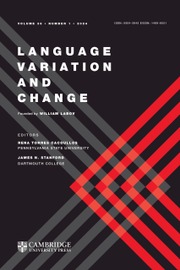Article contents
Attitudes and exposure as predictors of -t/d deletion among local and expatriate children in Singapore
Published online by Cambridge University Press: 28 November 2019
Abstract
Although orientation towards local norms is increasing in Singapore, Singapore English (SgE) is still perceived by some as a nonnative variety. Variation in attitudes towards SgE may shape acquisition of SgE features by both Singaporean and expatriate children, who increasingly attend government schools. The present study investigates how the -t/d deletion patterns of 60 children reflect their attitudes and school setting. Significant correlations are observed between deletion rate, attitude towards SgE, and accent self-perception among Singaporean children, highlighting that this variety is undergoing endonormative stabilization. However, while some expatriates in local schools delete more than peers in international schools, expatriate children generally do not acquire local -t/d deletion rates or constraints, regardless of familiarity with SgE or attitudes towards the variety. This gap between locals and expatriates reflects the persistence of ideologies that delegitimize SgE, as well as the growing prominence of SgE as a marker of local identity.
- Type
- Research Article
- Information
- Copyright
- Copyright © Cambridge University Press 2019
Footnotes
This research was supported by a startup grant from the National University of Singapore. The author wishes to thank research assistants Andre Joseph Theng, Kevin Martens Wong, Natalie Tong Jing Yi, Nurul Afiqah Bte Ibrahim, Alicia Chua Mei Yin, Clarice Yong Hui Min, Frances Loke Wei, Helen Dominic, Keith Jayden Fernandez, Matthew Peh Tian Jing, Fiona Teo Sze Lynn, Sheryl Lim Wen Xi, Amanda Choo Shimin, Huimimn Teo, Anne Prusky, Guo Zhenhao, and Yin Lin Tan for their various contributions to the Voices of Children in Singapore project. Additional thanks to Mie Hiramoto, Roey Gafter, Lauren Hall-Lew, and members of the NUS-EL Sociolinguistics Reading Group for their helpful comments, and to the participants and their families for volunteering their time.
References
REFERENCES
- 5
- Cited by


